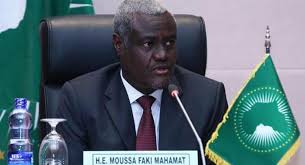By Abraham Tekle
Close to 30,000 displaced in most recent bout of violence
The chair of the African Union Commission has joined international diplomatic missions in expressing “deep concern” about intensified hostilities in disputed areas of northern Ethiopia that have been cause for renewed displacement in Raya Alamata, Zata, and Ofla.
Moussa Faki Mahamat, chairperson of the AUC, called for a halt to the violence and the protection of civilians in the disputed areas in a statement released on April 25, 2024. He emphasized the need for the thorough implementation of the terms of the Pretoria agreement signed in November 2022.
A recent escalation of hostilities between armed forces from the Amhara and Tigray regions has resulted in clashes in disputed territories in several woredas in the Southern Tigray Zone. The clashes followed the federal government’s dismantling of local administrations in the area after forces from the neighboring Amhara region gained control amid the two-year war.
The most recent round of conflict, which began on April 13, persisted for two days before federal forces intervened and established control of Alamata town.
Local officials, including Alamata Mayor Hailu Abera, confirmed the clashes.
In response to the violence, on April 15, Tigray Interim Administration (TIA) president Getachew Reda condemned the conflict on his X (Twitter) account and attributed it to parties who seek to undermine the Pretoria CoHA. He emphasized that the developments in Southern Tigray and other occupied territories were “not about a conflict between the federal government, the interim administration, or the TPLF”.
However, on April 17, 2024, the Amhara regional administration released a statement accusing the TPLF of invading Amhara territories, violating the Pretoria agreement, and causing the recent conflict.
The statement described the TPLF as “the enemy and security threat of the whole of Ethiopia” which had not learned from past conflicts. It also stated that it had made repeated efforts to initiate talks through the federal government but that the TPLF had “abandoned” the peace option and “invaded” several areas.
The statement urged the TPLF to respect the Pretoria agreement, refrain from waging war, and vacate the occupied areas.
“The government and people of the Amhara region would be compelled to work with other Ethiopians to protect the country from destruction and violence,” the statement reads.
General Tadesse Worede, deputy head of the Tigray Interim Administration, highlighted the responsibility of the Ethiopian government to ensure the liberation of Tigray territories occupied by the invasion.
He stressed that their forces have not taken violent actions and are committed to not violating the peace agreement.
“Efforts are underway to implement the peace agreement and facilitate the return of displaced individuals to their villages,” Tadesse said.
During an appearance on ‘BBC Focus on Africa’, Getachew Reda also emphasized the importance of providing security guarantees for the return of IDPs. He said the implementation of the peace agreement has taken time and “collaboration between the federal government, the TIA, and the Amhara region is necessary to expedite the process”.
On April 19, the United Nations Office for Coordination of Humanitarian Affairs (UNOCHA) reported significant displacement due to the renewed conflict, with 29,000 people displaced from rural areas in Alamata. The majority were forced into Kobo North Wollo, and close to 6,000 into Sekota and Wag-Hemra.
The report noted that the majority of the displaced are children and women.
International diplomatic missions in Addis Ababa, including those from Canada, France, Germany, Italy, Japan, the US, and the UK, have also expressed deep concern over the conflict.
They released a joint statement urging de-escalation and the protection of civilians, stressing the importance of disarmament, disbandment, and rehabilitation of armed forces (DDR), along with a peaceful return of displaced persons.
“Inclusive dialogue among all stakeholders is the only way to ensure lasting peace and resolve Ethiopia’s complex political and security challenges,” reads the statement.
On April 24, the Ethiopian National Security Council issued a statement highlighting that the Pretoria peace agreement marks a significant turning point in Ethiopia’s approach to resolving conflicts where Ethiopia has experienced recurrent internal conflicts and wars, leading to substantial national losses.
According to the statement, the shift in approach has allowed Ethiopia to start rebuilding and healing from the destruction caused by previous wars.
“This peace agreement is a bold step in breaking the cycle of violence and establishing lasting peace. Ethiopia has taken steps to address contested areas and facilitate the return of displaced people,” it reads.
The statement mentioned that DDR programs are being implemented to ensure former combatants have opportunities for their transition to civilian life.
Source: The Reporter


Leave a Reply